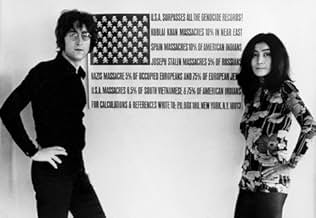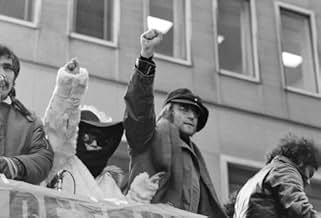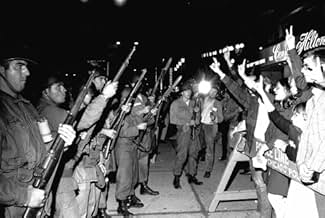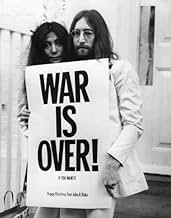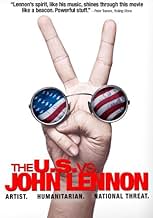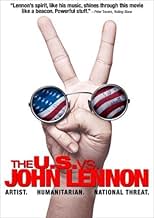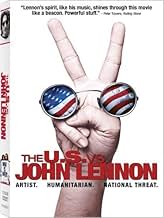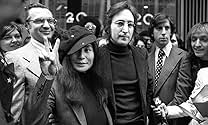IMDb-BEWERTUNG
7,3/10
5716
IHRE BEWERTUNG
Füge eine Handlung in deiner Sprache hinzuA documentary on the life of John Lennon, with a focus on the time in his life when he transformed from a musician into an antiwar activist.A documentary on the life of John Lennon, with a focus on the time in his life when he transformed from a musician into an antiwar activist.A documentary on the life of John Lennon, with a focus on the time in his life when he transformed from a musician into an antiwar activist.
- Regie
- Drehbuch
- Hauptbesetzung
- Auszeichnungen
- 2 Nominierungen insgesamt
John Lennon
- Self
- (Archivfilmmaterial)
Empfohlene Bewertungen
For those of us who followed Lennon and the Beatles through those tumultuous years, this was a simple summary that really didn't break any ground or uncover any new information. The filmmakers were more excited to find a few pieces of lost or mislabeled footage, such as Lennon being given his green card, than to enlighten those of us who were along for the ride all along. But it was good to hear from John again, even to say "flower power didn't work, so what? You do something else." No coverage was given John's activism or lack thereof during his infamous "lost weekend." Yoko's constant presence saw to that.
But I would love for my son and his generation to see it. Much of what is going on today has gone unchallenged, and the return of the J. Edgar Hooverization of America has been obvious to those of us who were awake back then.
But I would love for my son and his generation to see it. Much of what is going on today has gone unchallenged, and the return of the J. Edgar Hooverization of America has been obvious to those of us who were awake back then.
For those who are too young to remember the real John Winston Ono Lennon -- this film is a good introduction to why he mattered so, why so many people were (and are) devoted to him as an artist and a man, why he was truly the most original voice of his generation.
The film is not perfect -- but in its defense, it covers an extraordinary amount of material and does it well.
Lennon lived 100 lifetimes between 1969 and 1975.
This film concentrates on the biggest conflict he faced at that time: his struggles to remain in the US, and the right-wing paranoia (exemplified by FBI director J Edgar Hoover and Nixon's hatchet man, John Ehrlichman.)
Lennon's sincerity, his naiveté, his charisma shine throughout.
Yoko has been attacked (so what else is new) for being such a strong presence in the film but she was right there beside him. They lived it all together. And she does not use her camera time to diminish him in any way.
Strong recommendation -- primarily because we have to remind ourselves that there are times to speak up and times to act.
John Lennon: we miss you so.
The film is not perfect -- but in its defense, it covers an extraordinary amount of material and does it well.
Lennon lived 100 lifetimes between 1969 and 1975.
This film concentrates on the biggest conflict he faced at that time: his struggles to remain in the US, and the right-wing paranoia (exemplified by FBI director J Edgar Hoover and Nixon's hatchet man, John Ehrlichman.)
Lennon's sincerity, his naiveté, his charisma shine throughout.
Yoko has been attacked (so what else is new) for being such a strong presence in the film but she was right there beside him. They lived it all together. And she does not use her camera time to diminish him in any way.
Strong recommendation -- primarily because we have to remind ourselves that there are times to speak up and times to act.
John Lennon: we miss you so.
I hope everyone sees this film, as it is a window into the life of an extraordinary person, who really did influence a generation with his music and his courage. But, I especially hope that the generations that came after John Lennon left us, so unexpectedly, have a chance to see this thoughtful and fitting tribute to the gentle artist who turned the hurt he experienced as a child into an international revolution with a spirit so open and willing to risk everything he had to teach the world that all we really need is love. This film explains to all of us, who were too young to understand what was going on, at the time, how John Lennon was persecuted by the U.S. government for simply expressing his opinion about the war in Viet Nam. How he was investigated, tapped, and followed, then threatened with deportation, in an effort to derail a tour that might have had a significant influence on the outcome of the 1972 presidential election, in which Richard Nixon was re-elected. The scenes of teenagers burning their Beatles records in protest of his quip that the Beatles had become more popular than Jesus, are eerily parallel with the Dixie Chicks fans who did the same thing. Excerpts from Nixon's speeches about the war are almost word-for-word the same rhetoric we get from Bush. This film is important, and moving, and includes some of the best music I know I'll ever hear in this lifetime. Go see it and get inspired.
"Imagine no possessions, I wonder if you can. No need for greed or hunger. A brotherhood of man. Imagine all the people, Sharing all the world. You may say I'm a dreamer. But I'm not the only one. I hope someday you'll join us. And the world will live as one." John Lennon, "Imagine" "All we are saying, Is give peace a chance." John Lennon, Give Peace a Chance I can't help hearing the song "Imagine" and feeling a little teary-eyed. I still remember being part of the worldwide vigil after John Lennon's murder and hearing the idealistic song, depicting a vision at that time suddenly sounding cruelly out-of-reach. The Beatles is one of those very few groups that seems to enjoy near-universal appreciation, from folks in their teens through those in retirement, including classical music aficionados as well as heavy metal enthusiasts. The songwriting power behind the group was primarily the genius of John Lennon and Paul McCartney, both of whom continued on to successful, creative solo careers.
With that background, how could I not jump at the opportunity to see a film about John Lennon? "The U.S. vs. John Lennon" is a documentary about the life of Lennon, specifically focusing on his peace activism during the Vietnam War era. I was certainly aware of his political engagement and songs such as "Give Peace a Chance", "Power to the People", and "Happy Christmas (War Is Over)". And I vaguely recall that there were some immigration issues that this English man faced in America. But I was not fully aware of, or perhaps forgot, how strongly the Nixon administration sought to deport John Lennon simply based on his views and activism.
The film moved at a very appropriate pace, introducing enough biography to help better understand the germane issues, quickly going through John's childhood, involvement with the Beatles, and marriage to his wife Yoko Ono. Consummate musician, John is quoted as saying that all that he really wanted to do was to make music. But the escalating violence in Vietnam made him an outspoken critic of the war. A master of publicity, he even turned what he knew would be dogged press during his honeymoon to his advantage by staging a well covered love-in for peace urging love and not war.
Richard Nixon held the office of President of the United States from 1969-1974 and is the only President to have resigned, facing impeachment for the "Watergate" scandal and clear abuse of power. In spite of election promises, Nixon plunged the country into deeper war with Vietnam amidst growing public outcry.
With the help of the heavy-handed J. Edgar Hoover, Director of the Federal Bureau of Investigation for almost fifty years (from 1924 until his death in 1972), the Nixon administration sought to silence some in the anti-war movement. It tried to deport John Lennon and, finding that he had a small charge of marijuana possession filed back in England earlier, used that as a pretext to demand his departure.
Eventually, Lennon's lawyer countersued and proved that the Nixon administration has conspired against him, with people from the very top of the government involved. Lennon won and was granted permanent immigration status to allow him to stay in New York, the city he loved. Unfortunately, in 1980, John Lennon was gunned down outside of his New York apartment by a deluded fan.
"The U.S. vs. John Lennon" is a moving film about a person larger than reality as if being a prolific and well-recognized songwriter weren't enough, he was a singer, guitarist, author, and political leader who embodied nonviolence and peace, influenced by Gandhi and he was very influential in each of these areas. Many would say that Lennon was one of the key spokespersons of the generation that came of age in the 1960s, and offered a vision of a world united by zest for living together and not divided by petty differences. It is also a film about how unchecked power can try to wield unfair influence in attacking its perceived enemies.
A vivid history lesson accompanied by many brilliant songs of John Lennon's, I highly recommend "The U.S. vs. John Lennon" to all (note that it is rated PG-13 for some "strong language, violent images and drug references" but I wonder if that is a little overstated). Viewers will (re)learn important biographical and historical aspects of the man and times, and, more importantly, see John Lennon's message for its universality and timelessness. The music alone will likely rekindle or begin new memories, and the documentary is a fascinating review of an important era in recent history.
8 stars out of 10
--Dilip Barman, Durham, NC
With that background, how could I not jump at the opportunity to see a film about John Lennon? "The U.S. vs. John Lennon" is a documentary about the life of Lennon, specifically focusing on his peace activism during the Vietnam War era. I was certainly aware of his political engagement and songs such as "Give Peace a Chance", "Power to the People", and "Happy Christmas (War Is Over)". And I vaguely recall that there were some immigration issues that this English man faced in America. But I was not fully aware of, or perhaps forgot, how strongly the Nixon administration sought to deport John Lennon simply based on his views and activism.
The film moved at a very appropriate pace, introducing enough biography to help better understand the germane issues, quickly going through John's childhood, involvement with the Beatles, and marriage to his wife Yoko Ono. Consummate musician, John is quoted as saying that all that he really wanted to do was to make music. But the escalating violence in Vietnam made him an outspoken critic of the war. A master of publicity, he even turned what he knew would be dogged press during his honeymoon to his advantage by staging a well covered love-in for peace urging love and not war.
Richard Nixon held the office of President of the United States from 1969-1974 and is the only President to have resigned, facing impeachment for the "Watergate" scandal and clear abuse of power. In spite of election promises, Nixon plunged the country into deeper war with Vietnam amidst growing public outcry.
With the help of the heavy-handed J. Edgar Hoover, Director of the Federal Bureau of Investigation for almost fifty years (from 1924 until his death in 1972), the Nixon administration sought to silence some in the anti-war movement. It tried to deport John Lennon and, finding that he had a small charge of marijuana possession filed back in England earlier, used that as a pretext to demand his departure.
Eventually, Lennon's lawyer countersued and proved that the Nixon administration has conspired against him, with people from the very top of the government involved. Lennon won and was granted permanent immigration status to allow him to stay in New York, the city he loved. Unfortunately, in 1980, John Lennon was gunned down outside of his New York apartment by a deluded fan.
"The U.S. vs. John Lennon" is a moving film about a person larger than reality as if being a prolific and well-recognized songwriter weren't enough, he was a singer, guitarist, author, and political leader who embodied nonviolence and peace, influenced by Gandhi and he was very influential in each of these areas. Many would say that Lennon was one of the key spokespersons of the generation that came of age in the 1960s, and offered a vision of a world united by zest for living together and not divided by petty differences. It is also a film about how unchecked power can try to wield unfair influence in attacking its perceived enemies.
A vivid history lesson accompanied by many brilliant songs of John Lennon's, I highly recommend "The U.S. vs. John Lennon" to all (note that it is rated PG-13 for some "strong language, violent images and drug references" but I wonder if that is a little overstated). Viewers will (re)learn important biographical and historical aspects of the man and times, and, more importantly, see John Lennon's message for its universality and timelessness. The music alone will likely rekindle or begin new memories, and the documentary is a fascinating review of an important era in recent history.
8 stars out of 10
--Dilip Barman, Durham, NC
One of the younger reviewers commented:
"I couldn't help but compare the era and social climate around this movie to what we are experiencing today. I am disturbed and disappointed. Why is it that it seemed as if there were loads more people being active in what they believed back in those days. I understand that it was a different time, and many in the world were just learning to use their voices... Perhaps we feel that we just don't know enough about a subject to get behind it and speak out? ... Perhaps large protests are just being overlooked because we as viewers or the media is over it... I am just wondering why I haven't done more. Why does it seem as if people today (not just my "generation" or my "community") are fearful or apathetic towards fighting for what they think is right? I don't want to preach or be dramatic here - I'm not telling you to view things my/their/our/its/his/her way. I'm just saying, I can't imagine that we've gone through life without seeing some sort of injustice - there has to be something you've seen that you think is wrong... why not say something about it? Is being charitable enough anymore? Awareness is key. Why is there this silence amongst us?"
Perhaps I'm being too simplistic, but I've often thought as a survivor of the Viet-Nam era, that the main reason we haven't seen protests of the magnitude depicted in The US vs John Lennon in recent times is simply the absence of the draft. Plenty of people again object to the war situation, but without the threat of involuntary servitude there simply is no critical mass. The fear of self, friends, and family being rounded up and shot proved great motivation to get people out in the streets back then. The censorship of the media imposed since Viet-Nam (embedded journalists, qv) has also helped still the voices.
So at the very least, this film has helped present an historical perspective all but absent in the present day. Viet-Nam so divided the country that the divisions remain today. Yet that war is curiously neglected in our educational curricula.
Beyond that is revealed a portrait of John Lennon, artist and young man. Lennon, the single one of the Four who strove at great personal cost to better the world with far more than silly love songs is revealed here in a montage of film and stills that conveys far more than the press of the time was able or wiling to.
The film opens with footage from his 1971 appearance at the John Sinclair Freedom Rally at Crisler Area in Ann Arbor, Michigan. As a former UM Ann Arbor Student I particularly appreciate how the producers of the film illustrate the pivotal nature of that event. At the time the event seemed like a big deal locally, but one that was lost amongst the din of social commotion. As close as I was geographically, I didn't realize then just how influential Lennon's (or Sinclair's) involvement was in the successful movement to end the war.
I suggest that any student (young or older) of how that peace movement progressed back then should see this film. Serious students should see it more than once. In addition to the collection of seldom seen film footage, there is a very fine sound track. See the film on the big screen if you can. I'll put my order in for the DVD as soon as it can be had, but the big screen, hi-fi version rocks.
"I couldn't help but compare the era and social climate around this movie to what we are experiencing today. I am disturbed and disappointed. Why is it that it seemed as if there were loads more people being active in what they believed back in those days. I understand that it was a different time, and many in the world were just learning to use their voices... Perhaps we feel that we just don't know enough about a subject to get behind it and speak out? ... Perhaps large protests are just being overlooked because we as viewers or the media is over it... I am just wondering why I haven't done more. Why does it seem as if people today (not just my "generation" or my "community") are fearful or apathetic towards fighting for what they think is right? I don't want to preach or be dramatic here - I'm not telling you to view things my/their/our/its/his/her way. I'm just saying, I can't imagine that we've gone through life without seeing some sort of injustice - there has to be something you've seen that you think is wrong... why not say something about it? Is being charitable enough anymore? Awareness is key. Why is there this silence amongst us?"
Perhaps I'm being too simplistic, but I've often thought as a survivor of the Viet-Nam era, that the main reason we haven't seen protests of the magnitude depicted in The US vs John Lennon in recent times is simply the absence of the draft. Plenty of people again object to the war situation, but without the threat of involuntary servitude there simply is no critical mass. The fear of self, friends, and family being rounded up and shot proved great motivation to get people out in the streets back then. The censorship of the media imposed since Viet-Nam (embedded journalists, qv) has also helped still the voices.
So at the very least, this film has helped present an historical perspective all but absent in the present day. Viet-Nam so divided the country that the divisions remain today. Yet that war is curiously neglected in our educational curricula.
Beyond that is revealed a portrait of John Lennon, artist and young man. Lennon, the single one of the Four who strove at great personal cost to better the world with far more than silly love songs is revealed here in a montage of film and stills that conveys far more than the press of the time was able or wiling to.
The film opens with footage from his 1971 appearance at the John Sinclair Freedom Rally at Crisler Area in Ann Arbor, Michigan. As a former UM Ann Arbor Student I particularly appreciate how the producers of the film illustrate the pivotal nature of that event. At the time the event seemed like a big deal locally, but one that was lost amongst the din of social commotion. As close as I was geographically, I didn't realize then just how influential Lennon's (or Sinclair's) involvement was in the successful movement to end the war.
I suggest that any student (young or older) of how that peace movement progressed back then should see this film. Serious students should see it more than once. In addition to the collection of seldom seen film footage, there is a very fine sound track. See the film on the big screen if you can. I'll put my order in for the DVD as soon as it can be had, but the big screen, hi-fi version rocks.
Wusstest du schon
- Zitate
Gore Vidal: Patriotism is the last refuge of the scoundrel.
- SoundtracksJohn Sinclair
Written by John Lennon
Performed by John Lennon
Courtesy of Capitol Records
Under license from EMI Film & Television Music
Top-Auswahl
Melde dich zum Bewerten an und greife auf die Watchlist für personalisierte Empfehlungen zu.
- How long is The U.S. vs. John Lennon?Powered by Alexa
Details
Box Office
- Bruttoertrag in den USA und Kanada
- 1.109.146 $
- Eröffnungswochenende in den USA und in Kanada
- 69.143 $
- 17. Sept. 2006
- Weltweiter Bruttoertrag
- 1.408.065 $
- Laufzeit1 Stunde 39 Minuten
- Farbe
- Seitenverhältnis
- 1.78 : 1
Zu dieser Seite beitragen
Bearbeitung vorschlagen oder fehlenden Inhalt hinzufügen

Oberste Lücke
By what name was Akte USA vs. John Lennon (2006) officially released in India in English?
Antwort

